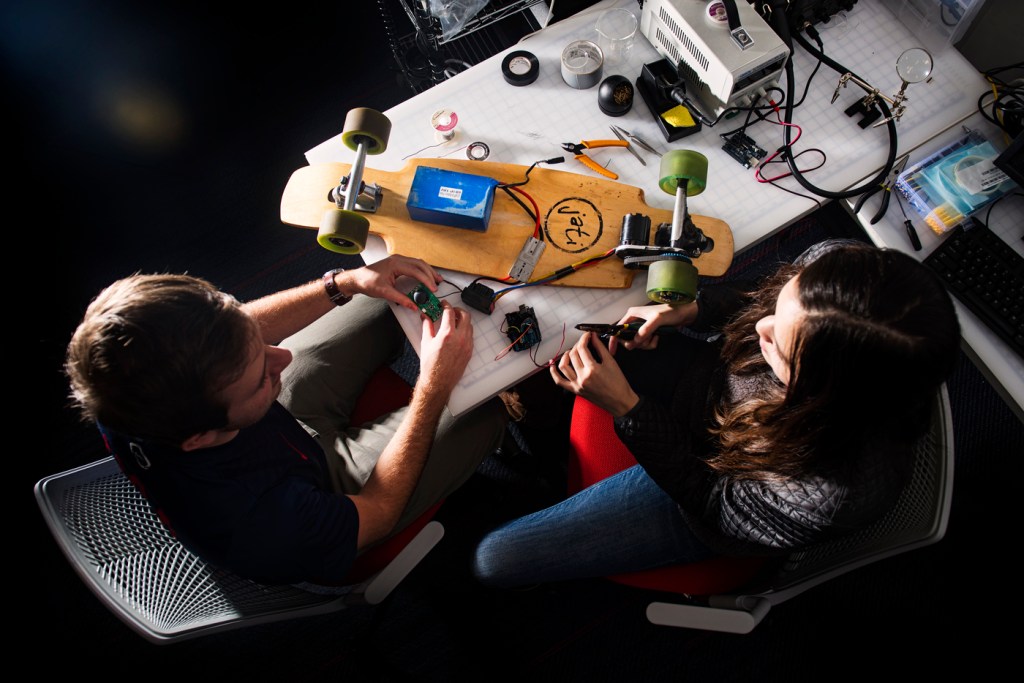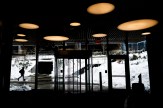Built for Northeastern

Northeastern student Ian Carlson is the founder of Dash Electric, which is developing “the first electric skateboard designed for the real world.” Dash, he says, serves as a means of engaging first-time longboard users as well as solving what is known as the “last mile problem”—that many homes and businesses in urban environments aren’t situated close to a transit station.
Last summer Carlson, AMD’17, turned to his peers to help take Dash to the next level—specifically, the senior applied to Generate, Northeastern’s student-led product development studio. Through this partnership, a team of Northeastern engineering students spent the fall semester building a case for the longboard’s remote and developing an electronics system that would enable wireless communication between the remote and the longboard’s circuit board.
This type of collaboration—Northeastern students building prototypes and other products to help student, faculty, staff, and alumni entrepreneurs advance their ventures—is the brainchild of Generate executive director Mina Iskarous and technology director Bailey Kane. In 2015, the then second-year students saw Northeastern’s bustling entrepreneurial ecosystem growing by leaps and bounds and identified an opportunity to build upon this momentum.
“We knew there were a lot of ventures that needed help building their products, and that there were engineers who wanted this experience,” says Iskarous, E’19.
Generate brings them together.
Carlson and the Generate team working with Dash described the experience as mutually beneficial and raved about the opportunity to collaborate. “I really wanted this cross-disciplinary experience,” said fourth-year mechanical engineering major and Generate team member Mary Morrison. She pointed to the experience gained from coding and using Arduino—an open-source electronics platform based on easy-to-use hardware and software—this semester, adding that she learned more about the business side of going from prototyping to larger-scale manufacturing.

Generate team members Andrew Mello and Mary Morrison, both E’18, work on their product for Dash Electric in the Sherman Center on Dec. 14, 2016. Photo by Adam Glanzman/Northeastern University
Andrew Mello, a fourth-year electrical engineering major, underscored the hands-on technical skills and knowledge acquired through hours of research and building and testing components. As the project leader, Mello said he also grew his leadership skills from overseeing the team and the project’s deliverables.
In addition to Dash, Generate had two other clients this past semester: TropoGarden, which is developing a semi-automated indoor garden; and LZ Innovations, which is designing a magnetic rebar cap to keep such caps from slipping off in an effort to improve safety on construction sites. Generate will partner with three new clients during the spring semester—one of which is SizeU, which is developing an internet of things tape measuring device to change the conversation when picking clothing from what is your size to what is your style. Generate will help develop a minimum viable product and help conduct user experience testing.
As Iskarous sees it, Generate’s mission aligns with Northeastern’s emphasis on experiential education and student entrepreneurship. He and Kane launched Generate in fall 2015, and the Build Studio—Generate’s flagship program—began taking clients in the spring 2016 semester. Generate also holds office hours and runs a speaker series to engage and educate the Northeastern community on topics such as product development and new technologies.
“Our vision is to build, inspire, and educate the next generation of entrepreneurial product builders at Northeastern University,” Iskarous says.
Generate is part of Mosaic, an alliance of student-led organizations that supports the incubation of early-stage ventures at Northeastern. Together, these Mosaic organizations—including the venture accelerator IDEA—work together to help ventures meet the real-world challenges facing startups. These organizations collectively provide many resources, including funding, connections to mentors, guidance around protecting intellectual property, and design help.
Our vision is to build, inspire, and educate the next generation of entrepreneurial product builders at Northeastern University.
—Mina Iskarous, E’19, Generate’s executive director
Generate works out of the Michael and Ann Sherman Center for Engineering Entrepreneurship Education, which provides 3-D printing equipment, software, meeting space, and other resources for the Build Studio teams to design and build products for their clients. Professor Shashi Murthy, the center’s director and Generate’s co-faculty advisor, says he was impressed with the Generate leadership team’s initial vision for creating a peer-to-peer model, and he underscored the group’s professionalism in executing that vision and growing rapidly over the past year.
Both Murthy and Iskarous also pointed to the critical role alumni mentors have played in Generate’s success, noting the invaluable industry experience they’ve brought to guiding these student teams toward achieving their clients’ needs.
“Generate is an integral part of what defines the Sherman Center, and by extension what defines the university’s entrepreneurial ecosystem,” Murthy says.
Mark Sivak, associate teaching professor and a co-faculty advisor to Generate, says he’s been impressed with the organization’s leadership and its work with clients. “The questions are the right ones, and the solutions are the right ones, too,” he says.
Generate, he adds, offers students an opportunity “to amplify what happens on co-op and in the classroom in a cool way.” Students gain hands-on experience, get exposed to the various engineering disciplines, make connections throughout Northeastern and “see the whole playing field” in terms of the types of people they might interact with while working at a startup. As he put it, “Generate allows them to see what the pieces of the puzzle are and how they fit together.”





